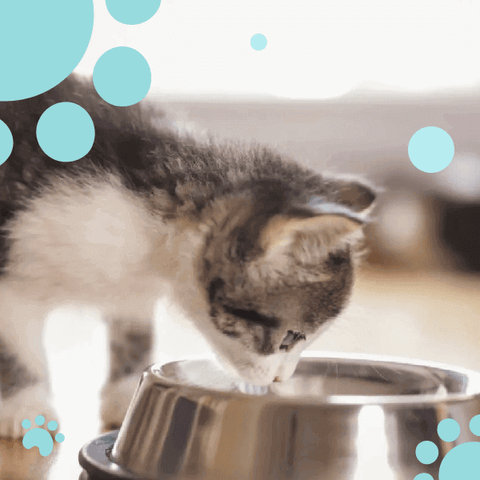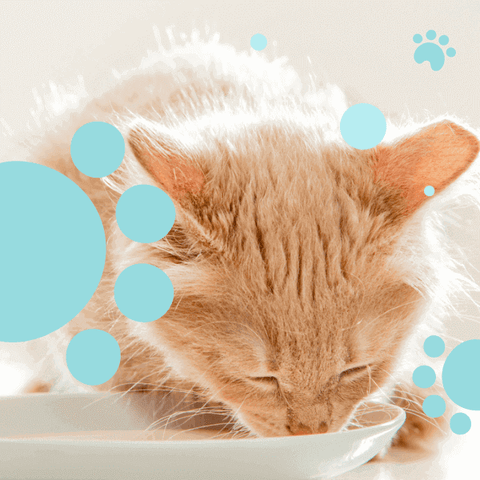How many times to feed a kitten milk is an essential part of their early development. As newborns, kittens rely on their mother's milk or a milk replacer for complete nutrition. Providing the appropriate amount and type of milk can help ensure that your kitten grows and develops properly. Learn everything you need about kitten feeding and find the answers to all of your concerns.
-
How many times to feed kitten milk?
how many times to feed a kitten milk depends on its age. Newborn kittens, from birth to 4 weeks of age, need to be fed milk every 2-3 hours, or about 8-12 times a day. At around 4 weeks of age, kittens can start to be introduced to solid food, and the frequency of milk feedings can be gradually reduced. By 8 weeks of age, most kittens are fully weaned and no longer need to be fed milk.
Should also be mentioned that how many times to feed a kitten milk should be a specially formulated kitten milk replacement or formula, as cow's milk is not appropriate for kittens and can cause digestive upset.
-
How many times should a 3-week-old kitten drink milk?

A 3-week-old kitten should be fed milk or a milk replacer about every 4-6 hours or approximately 4-6 times per day.
At this age, kittens are still reliant on their mother's milk or a milk replacer for complete nutrition. As they grow, their stomachs will also become larger, allowing them to consume more milk at each feeding and gradually reduce the frequency of feedings.
During this period, kittens should not be fed cow's milk, as it can be difficult for them to digest and may cause stomach upset or diarrhea. Instead, you should use a specially formulated kitten milk replacer, which is available at most pet stores and veterinary clinics.
-
How many times should a 1-month-old kitten drink milk?

And now how many times to feed a kitten milk who are 1-month-old kittens?
1-month-old kittens should be fed milk or milk replacer about every 4-5 hours or approximately 4-5 times per day.
At one month of age, a kitten is still in the early stages of development and will likely still be nursing or consuming milk replacer.
It's important to note that as kittens grow and their nutritional needs change, they will gradually require less milk and more solid food. During this time, it's important to introduce solid food gradually and monitor your kitten's weight and overall health to ensure they are getting the proper nutrition.
-
How much does to feed a kitten for 3 months?
At 3 months of age, most kittens are fully weaned and should be eating solid food exclusively. The amount of food a kitten needs at this age will depend on their weight, activity level, and overall health. As a general guideline, a 3-month-old kitten should be fed 3-4 small meals per day, with each meal consisting of about 1/4 to 1/3 cups of kitten food.
It's important to choose high-quality kitten food that is specifically formulated for their nutritional needs. Look for a food that is high in protein and provides a balance of vitamins and minerals. You should also avoid feeding your kitten table scraps or human food, as these can upset their stomach and lead to poor nutrition.
In addition to providing the appropriate amount of food, it's also important to ensure that your kitten has access to plenty of fresh water at all times. You should also monitor their weight and growth to ensure that they are getting the proper nutrition. If you have any concerns or questions about feeding your kitten, it's always best to consult with a veterinarian who can provide guidance and support.
read more How To Make Litter Box Non Stick
-
Can you overfeed a 3-week-old kitten?
Yes, it is possible to overfeed a 3-week-old kitten. Overfeeding can lead to digestive upset, diarrhea, and even dehydration, which can be dangerous for a young kitten.
At 3 weeks of age, kittens have very small stomachs and can only consume a small amount of milk or milk replacer at each feeding. It's important to follow the recommended feeding schedule and only offer the appropriate amount of milk or milk replacer at each feeding.
If you are bottle-feeding a kitten, it's important to pay attention to their cues and stop feeding when they show signs of fullness, such as turning away from the bottle or slowing down their suckling. Overfeeding can also lead to aspiration, which occurs when milk enters the kitten's lungs instead of their stomach, causing respiratory distress and potentially leading to pneumonia.
-
How much milk should a kitten drink?
The amount of milk a kitten should drink depends on their age, weight, and overall health. Newborn kittens need to be fed milk every 2-3 hours, or approximately 8-12 times a day, and the recommended amount of milk per feeding is about 2-3 millilitres per ounce of body weight.
-
How many times a day do you give kittens milk replacer?
The answer to how many times to feed a kitten milk replacer depends on their age. For newborn kittens up to 4 weeks of age, they need to be fed milk replacer or mother's milk every 2-3 hours, or approximately 8-12 times a day. As they grow and their stomachs become larger, they can consume more milk at each feeding and gradually reduce the frequency of feedings.
At 4 weeks of age, kittens can start to be introduced to solid food, and the frequency of milk feedings can be gradually reduced. By 8 weeks of age, most kittens are fully weaned and no longer need to be fed milk replacer.
But Why?
Because when you are feeding a kitten a milk replacer, you should follow the instructions on the product label regarding the recommended amount of milk replacer for each feeding. Overfeeding can lead to digestive upset and other health issues, so it's important to offer the appropriate amount of milk replacer at each feeding and to monitor your kitten's weight and overall health.
If you have any concerns or questions about feeding your kitten or their overall health, it's always best to consult with a veterinarian who can provide guidance and support.
FAQs:
-
Can I feed a kitten 3 times a day?
If your kitten is 3 months old or older and is eating solid food, feeding them 3 times a day is generally appropriate. At this age, kittens no longer need to consume milk and can obtain all their required nutrients from a balanced diet of kitten food.
-
What to feed newborn kittens without a mother?
If you have newborn kittens without a mother, it's important to provide them with a suitable milk replacer that is specifically formulated for kittens to ensure that they are getting the proper nutrition. Cow's milk is not appropriate for kittens, as it can be difficult for them to digest and may cause stomach upset or diarrhea.

